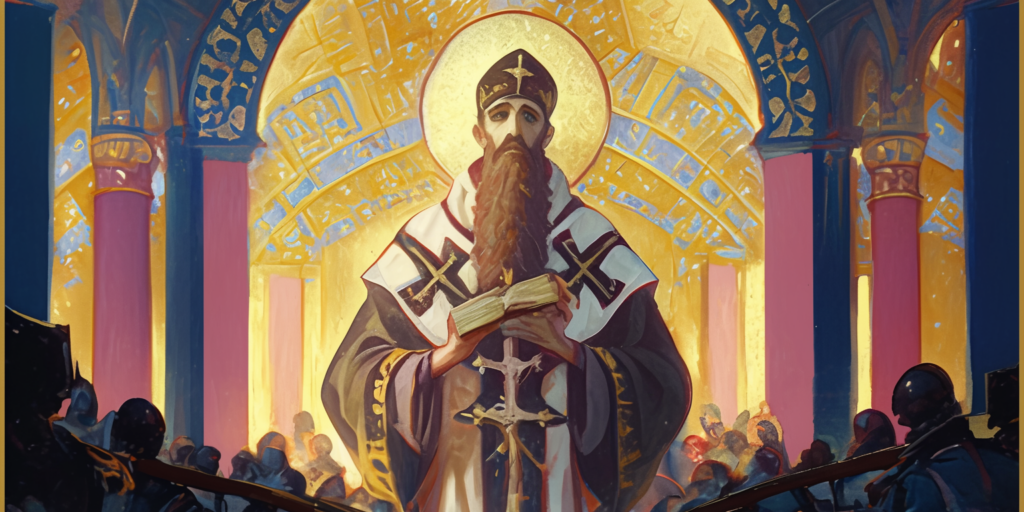
Saint of the Day: June 27, 2024
St. Cyril of Alexandria, born in Alexandria, Egypt, is celebrated as a staunch defender of the faith and one of the most brilliant theologians of the Alexandrian tradition. His life was marked by his dedication to theological clarity and his fierce defense of orthodox Christian doctrine.
Early Life and Rise to Patriarchate
Cyril was born into a prominent Christian family and was the nephew of Theophilus, the patriarch of Alexandria. He received a classical and theological education in Alexandria, preparing him for a life dedicated to the Church. After being ordained by his uncle, Cyril accompanied Theophilus to Constantinople in 403 and was present at the Synod of the Oak, which deposed John Chrysostom. Cyril initially supported the charges against Chrysostom, reflecting the complex and often contentious nature of ecclesiastical politics at the time.
Upon Theophilus’ death in 412, Cyril succeeded him as patriarch of Alexandria, but not without conflict. His election was marred by a riot between his supporters and those of his rival, Timotheus. Once established as patriarch, Cyril wasted no time in addressing what he saw as heretical movements and political challenges within his jurisdiction.
Conflicts and Controversies
Cyril’s tenure as patriarch was marked by several significant conflicts:
1. Against the Novatians: Cyril closed the churches of the Novatians, a sect that refused to readmit to communion those who had lapsed in faith during persecution.
2. Expulsion of the Jews: He drove the Jewish population from Alexandria following violent clashes, a decision that had lasting repercussions.
3. Conflict with Governor Orestes: Cyril clashed with the civil authorities, particularly with the governor Orestes, over issues of governance and authority.
The Nestorian Controversy
The most defining conflict of Cyril’s career was his opposition to Nestorius, the patriarch of Constantinople. Nestorius preached that Mary should not be called Theotokos (God-bearer) because he believed that Christ was divine and not human. Cyril vehemently opposed this view, arguing for the unity of Christ’s divine and human natures.
Cyril persuaded Pope Celestine I to condemn Nestorius at a synod in Rome. He also held a synod in Alexandria that echoed this condemnation. In 431, Cyril presided over the Third General Council at Ephesus, where some 200 bishops condemned Nestorius and his teachings. This action led to a schism when Archbishop John of Antioch and his followers held a counter-council and deposed Cyril. However, the arrival of Papal Legates confirmed the council’s decisions, leading to Cyril’s exoneration and Nestorius’s eventual exile.
Later Life and Theological Contributions
After reconciling with the Antiochene bishops, Cyril dedicated his remaining years to writing and theological reflection. His extensive body of work includes:
• Commentaries on John, Luke, and the Pentateuch
• Treatises on dogmatic theology
• Apologia against Julian the Apostate
• Numerous letters and sermons
Cyril’s writings are noted for their precise exposition, accurate thinking, and deep reasoning, which significantly shaped Christian theology. His efforts were pivotal in preventing Nestorianism and Pelagianism from gaining a foothold in the Christian community.
Legacy and Feast Day
Pope Leo XIII declared Cyril a Doctor of the Church in 1882, recognizing his contributions to theology and the Church’s doctrinal development. His feast day is celebrated on June 27th.
Prayer
St. Cyril of Alexandria, valiant defender of the faith and brilliant theologian, intercede for us that we may uphold the true doctrine of Christ and live in unity with the teachings of the Church. May your example inspire us to seek truth with zeal and to defend the faith with courage and wisdom. Amen.